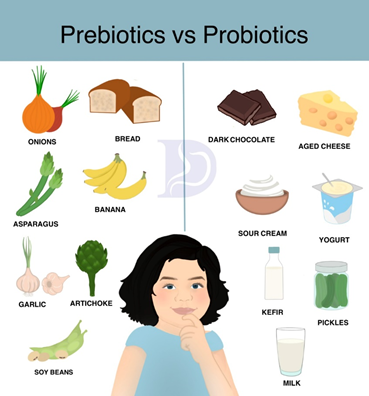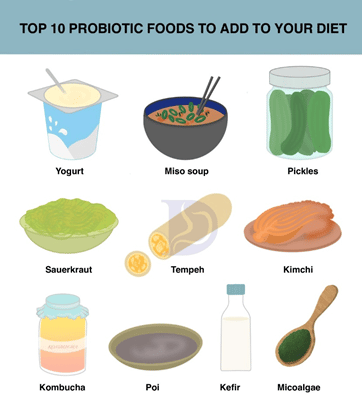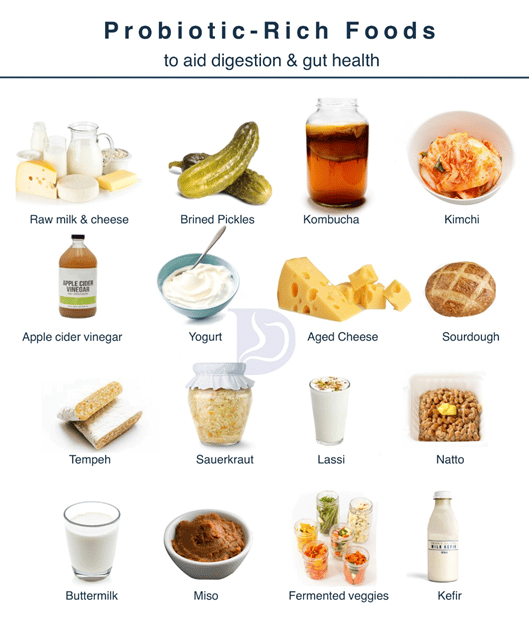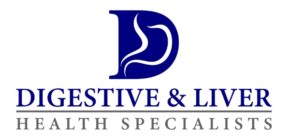Probiotics are bacteria and yeast supplements that benefit the digestive tract.1 Bacteria are usually seen in a negative light as something that makes us sick. However, not all types of bacteria cause illness in the body.
Probiotics are good bacteria that help keep the gut healthy and safe. Apart from a healthy gut, probiotics fight and prevent pathogenic bacteria from causing diseases in the body.
How do probiotics work?
There are two ways in which probiotics work to keep you healthy:
- Probiotics are a natural alternative to antibiotics. When the number of "beneficial bacteria" increases, pathogenic bacteria decrease, which prevents certain infections.
- Probiotics balance "good" and "pathogenic bacteria," which keeps all the body functions, especially digestion, under control.

Types of Probiotics
Three types of probiotics are commonly used2:
Lactobacillus: This is one of the most common probiotics. It is present in yogurt and other fermented products. Lactobacillus is helpful for people with diarrhea and lactose-intolerant individuals.
Bifidobacterium: This probiotic is present in dairy products and helps people suffering from irritable bowel syndrome.
Saccharomyces boulardii: This is a common yeast present in probiotics. It plays an excellent role in preventing diarrhea and digestive problems.
Where do beneficial bacteria live in the body?
The most common site of probiotics is the large intestine (gut). Other sites may include the following:
- Gut
- Mouth
- Vagina
- Urinary tract
- Lungs
- Skin

Probiotics and Intestinal Diseases
Apart from medications, probiotics are quite helpful in treating, improving, and preventing certain intestinal diseases. Hundreds of studies show that probiotics are necessary for good intestinal health.3
Intestinal infections in infants
Probiotics prevent and protect infants from intestinal infections by suppressing pathogenic bacteria.
Clostridium infections
Clostridium difficile bacterial infections are common in hospitals. One probiotic supplement is exceptionally effective against this nasty infection.
Prevents Pouchitis
A pouch is often made during certain colon surgeries. This pouch is prone to infections, which may lead to inflammation. Probiotics help avoid pouchitis in such patients.
Irritable bowel syndrome (IBS)
The bacteria makeup in IBS patients is different from that of normal people. Probiotic supplementation in IBS patients lessens the symptoms and improves the quality of life.
Ulcerative colitis and Crohn’s disease
Probiotics help minimize the symptoms, but more research is required in this field to determine if there are other significant contributions.
Allergies
Multiple studies show that infants and adults prone to allergies should take probiotics, as many benefits appear to be associated with them.
Immune factor
Beneficial bacteria residing in the colon play an essential role in maintaining a healthy immune system. Eating vegetables, fiber, and probiotics maintain an adequate number of beneficial bacteria, ensuring a healthy and active immune system.4
Recovers the Side Effects of Antibiotics
Nowadays, the rate of prescribed antibiotics has increased exponentially, which may disturb the normal beneficial microflora of the body. Taking probiotics helps replenish the adequate count.5
Guidelines on Taking Probiotics
- If you are healthy and eating 30–35g of fruits and vegetables daily, you likely do not need probiotics.
- If you have any intestinal disorders, consult a physician regarding probiotics.
- Purchase the recommended probiotics from a reputable manufacturer.
- Increase dairy and yogurt intake, as they are a good source of beneficial bacteria.
- Take probiotics with food instead of on an empty stomach to keep it away from stomach acid.
- Avoid intake of probiotics with serious medical conditions like HIV, AIDS, and other immune-related disorders.


References
- Shahrokhi M, Nagalli S. Probiotics. StatPearls. Published online July 4, 2022. Accessed September 2, 2022. https://www.ncbi.nlm.nih.gov/books/NBK553134/
- Fijan S. Microorganisms with Claimed Probiotic Properties: An Overview of Recent Literature. Int J Environ Res Public Health. 2014;11(5):4745. doi:10.3390/IJERPH110504745
- Behnsen J, Deriu E, Sassone-Corsi M, Raffatellu M. Probiotics: Properties, Examples, and Specific Applications. Cold Spring Harb Perspect Med. 2013;3(3):1-15. doi:10.1101/CSHPERSPECT.A010074
- Shi LH, Balakrishnan K, Thiagarajah K, Mohd Ismail NI, Yin OS. Beneficial Properties of Probiotics. Trop Life Sci Res. 2016;27(2):73. doi:10.21315/TLSR2016.27.2.6
- Gong C, Yang L, Liu K, et al. Effects of Antibiotic Treatment and Probiotics on the Gut Microbiome of 40 Infants Delivered Before Term by Cesarean Section Analysed by Using 16S rRNA Quantitative Polymerase Chain Reaction Sequencing. Med Sci Monit. 2021;27:e928467-1. doi:10.12659/MSM.928467

